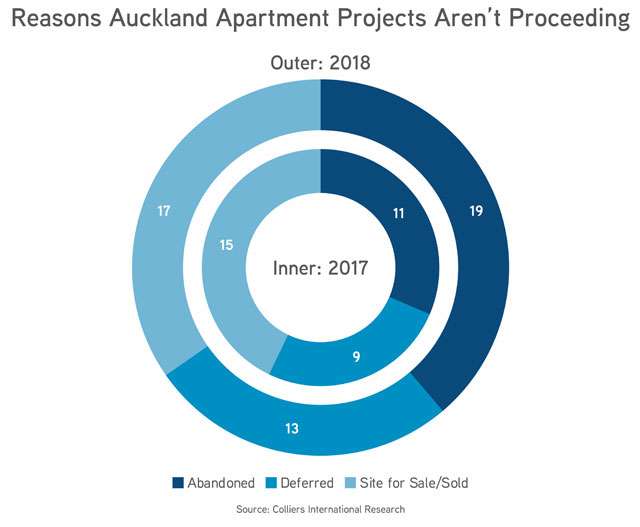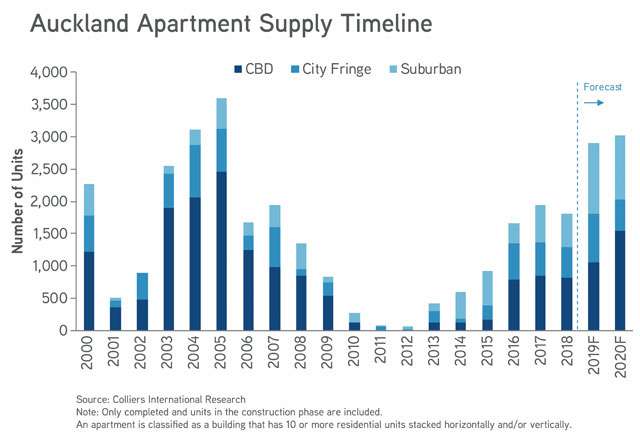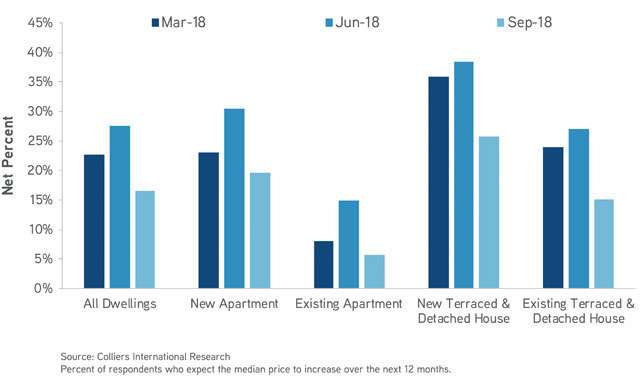Auckland's property market will not suffer a "hard landing" in 2019 - but a combination of slower price growth and high constructions costs will lead to a spike in abandoned developments, new research suggests.
There were 49 Auckland apartment projects that didn't proceed under their original plans in 2018, up from 35 the year before.
Reasons for the cancellation of projects included unrealistic market targets and improper project unit sizes.
Research from Colliers International found that of the 49 projects, 19 were abandoned, 13 were deferred and 17 saw their sites re-marketed for sale or sold.
Start your property search
Chris Dibble, Colliers International director of research, said: "Auckland is now in a prolonged period of price consolidation. There will not be a hard landing as the recent raft of legislative changes and market constraints have limited the sector’s susceptibility to such a correction.
"But lower rates of price growth in Auckland will have ripple effects throughout the development industry.

"A levelling off in sales prices and rates of sale, along with stubbornly high development costs, will lead to a cyclical high in deferred and abandoned projects. This will counter productively reduce future supply that is needed to unlock more affordable prices. While KiwiBuild will underwrite certain projects and enable supply, it’s not a long-term silver-bullet solution."
The Colliers research identified 2,231 Auckland apartment units (37 projects) in the marketing and design phase that could be completed by 2022 if they reach pre-sales thresholds.
It also identified another 6,022 terraced or detached housing units (74 projects) in the city that could be completed in the same time-frame.

"The total number of units expected to be completed by the end of 2020 is likely to reach around 5,927. However, some of these projects could be subject to construction delays," Colliers said.
The research highlighted that Kiwi confidence in the apartment market had dropped.
A decreasing proportion of respondents to Colliers' separate September 2018 Residential Market Outlook Survey thought median prices in the next 12 months would increase for new and existing apartments and detached and terraced homes compared to June 2018.

Mr Dibble said: "To really deliver long-standing price stability and improve affordability, a number of conditions will need to emerge.
"In conjunction with the Government, the private sector will need to increase capacity, land values will need to recalibrate, innovative building, consenting and financial models will need to be instigated and expectations of capital growth moderated.
"If these conditions don’t eventuate, price growth rates will likely creep further upwards sooner rather than later."
The Colliers research also found opportunities for more sophisticated, long-term rental living options in New Zealand.
This was being driven by legislative and tax changes in the fragmented 'mum-and-dad' private residential sector, uncertainty in tenant tenure and positive attitudinal shifts towards renting from younger generations.
Mr Dibble said: "Following on from positive offshore experiences, there will be growth in the number of purpose-built residential projects for long-term renting (known as Build-to-Rent or BTR in the UK and Australia and multi-family in the US) as well as investment vehicles and funds undertaking large scale investments of residential projects for Invest-to-Rent products.
"New Zealand's current handful of projects will more than double in number in 2019. We will still be some way behind the US, UK and Australia, but the timing is right."








































































